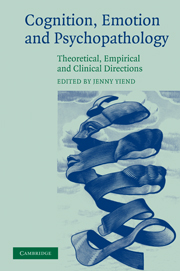Book contents
- Frontmatter
- Contents
- List of contributors
- An introduction and synthesis
- Andrew Mathews: a brief history of a clinical scientist
- Part I Theoretical approaches
- Part II Empirical directions
- Part III Clinical perspectives
- 10 Maintenance mechanisms in social anxiety: an integration of cognitive biases and emotional processing theory
- 11 Mental imagery and social phobia
- 12 Experimental cognitive psychology and clinical practice: autobiographical memory as a paradigm case
- 13 Mindfulness-based cognitive therapy
- 14 Clinical difficulties to revisit
- Index
12 - Experimental cognitive psychology and clinical practice: autobiographical memory as a paradigm case
Published online by Cambridge University Press: 23 November 2009
- Frontmatter
- Contents
- List of contributors
- An introduction and synthesis
- Andrew Mathews: a brief history of a clinical scientist
- Part I Theoretical approaches
- Part II Empirical directions
- Part III Clinical perspectives
- 10 Maintenance mechanisms in social anxiety: an integration of cognitive biases and emotional processing theory
- 11 Mental imagery and social phobia
- 12 Experimental cognitive psychology and clinical practice: autobiographical memory as a paradigm case
- 13 Mindfulness-based cognitive therapy
- 14 Clinical difficulties to revisit
- Index
Summary
It is the sixth session of cognitive therapy for depression. The patient, Julie, is talking about some difficulties with her mother.
Julie: I always find that I get upset when my mother talks to me like that.
Therapist: You find it difficult?
Julie: Oh yes. I don't know why – it's been going on a long time.
Therapist: Can you give me an example of such a time, when it was difficult for you?
Julie: It's always the same thing. She rings me about something fairly harmless, and then I tell her something; then she starts to tell me what I should do.
Therapist: Can you describe such a time?
Julie: It's often late at night, when I'm tired. I don't have the energy to fight back.
Therapist: Can you tell me about a particular time, perhaps something that happened recently?
Julie: The sort of thing she'll say is: ‘Why don't you ask Charlie to help?’ – things like that – she undermines me all the time.
What is going on here? The therapist is asking for more detail about her patient's recurrent situation, and although more detail of a sort is emerging, it is not yet episodic information. That is, this patient, even after three prompts, is not identifying a particular occasion. Perhaps she doesn't want to be more specific. Yet this is six sessions into the therapy, and she has disclosed issues that are much more ‘sensitive’ that these phone calls. Perhaps, then, she does not understand. Perhaps. But soon the therapist will give up asking for details and move on, maybe to elicit thoughts.
- Type
- Chapter
- Information
- Cognition, Emotion and PsychopathologyTheoretical, Empirical and Clinical Directions, pp. 251 - 269Publisher: Cambridge University PressPrint publication year: 2004



